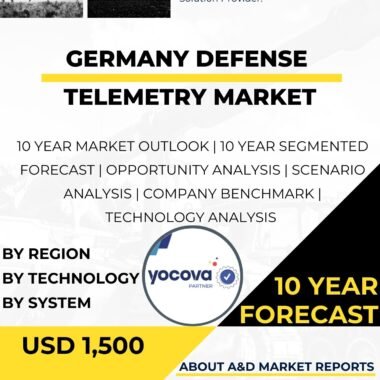Description
The Belgium defense telemetry market is a significant segment within the country’s defense industry. Telemetry systems play a crucial role in collecting, monitoring, and transmitting real-time data from various defense platforms, such as missiles, aircraft, and unmanned systems. Belgium recognizes the importance of advanced telemetry technologies in enhancing its defense capabilities, improving operational efficiency, and optimizing the performance of its defense systems.
The primary driver for the Belgium defense telemetry market is the need for accurate and reliable data collection and transmission for defense applications. Telemetry systems enable the real-time monitoring of critical parameters such as speed, altitude, temperature, and vibration, providing valuable insights into the performance and condition of defense platforms. This data is essential for diagnostics, performance analysis, safety monitoring, and the optimization of operational effectiveness.
Belgium’s domestic defense industry plays a crucial role in the development, production, and integration of defense telemetry systems. Belgian companies, such as OIP Sensor Systems and Xenics, have expertise in telemetry technologies and contribute to the country’s defense capabilities. These domestic capabilities foster innovation, create job opportunities, and contribute to the economic growth of the Belgium defense telemetry market.
Collaborations with international partners and suppliers are also significant for the Belgium defense telemetry market. Belgium often engages in partnerships with defense companies from NATO member states and other allied nations to access advanced telemetry technologies, benefit from joint development programs, and ensure interoperability with allied forces. These collaborations enable Belgium to leverage global advancements in defense telemetry and enhance its military capabilities.
Furthermore, Belgium’s participation in multinational defense initiatives influences the defense telemetry market. Collaboration within NATO and other international defense cooperation programs fosters interoperability, joint training exercises, and the exchange of best practices. This cooperation ensures compatibility and enhances operational effectiveness when conducting joint military operations with allied forces.
The Belgium defense telemetry market faces challenges such as technological advancements, data security, and integration considerations. Technological advancements in telemetry systems, including improvements in data acquisition, transmission protocols, and data analysis capabilities, require continuous research and development efforts. The Belgium market needs to stay at the forefront of innovation to provide state-of-the-art telemetry systems that meet evolving defense requirements.
Data security is a critical aspect of defense telemetry systems. With the increasing sophistication of cyber threats, Belgium’s defense industry must ensure the secure and encrypted transmission of telemetry data to prevent unauthorized access, data breaches, and potential disruptions to defense operations. Robust encryption, authentication protocols, and cybersecurity measures are essential to protect sensitive information and ensure the integrity of telemetry networks.
Integration considerations are crucial for the successful implementation of defense telemetry systems. Belgium’s defense industry must ensure seamless integration of telemetry systems with existing military infrastructure, command systems, and interoperability with allied forces. Interoperability, compatibility, and efficient data exchange between various telemetry platforms and personnel are essential for the successful operation of defense telemetry systems.
In conclusion, the Belgium defense telemetry market is a significant segment within the country’s defense industry. Telemetry systems play a crucial role in collecting, monitoring, and transmitting real-time data for defense applications. Domestic capabilities, collaborations with international partners, and Belgium’s participation in international defense initiatives drive the growth and development of the defense telemetry market. As defense requirements evolve and technological advancements continue, the demand for advanced telemetry systems that provide accurate and secure data collection and transmission is expected to increase, fostering innovation, collaboration, and economic growth within the sector.




